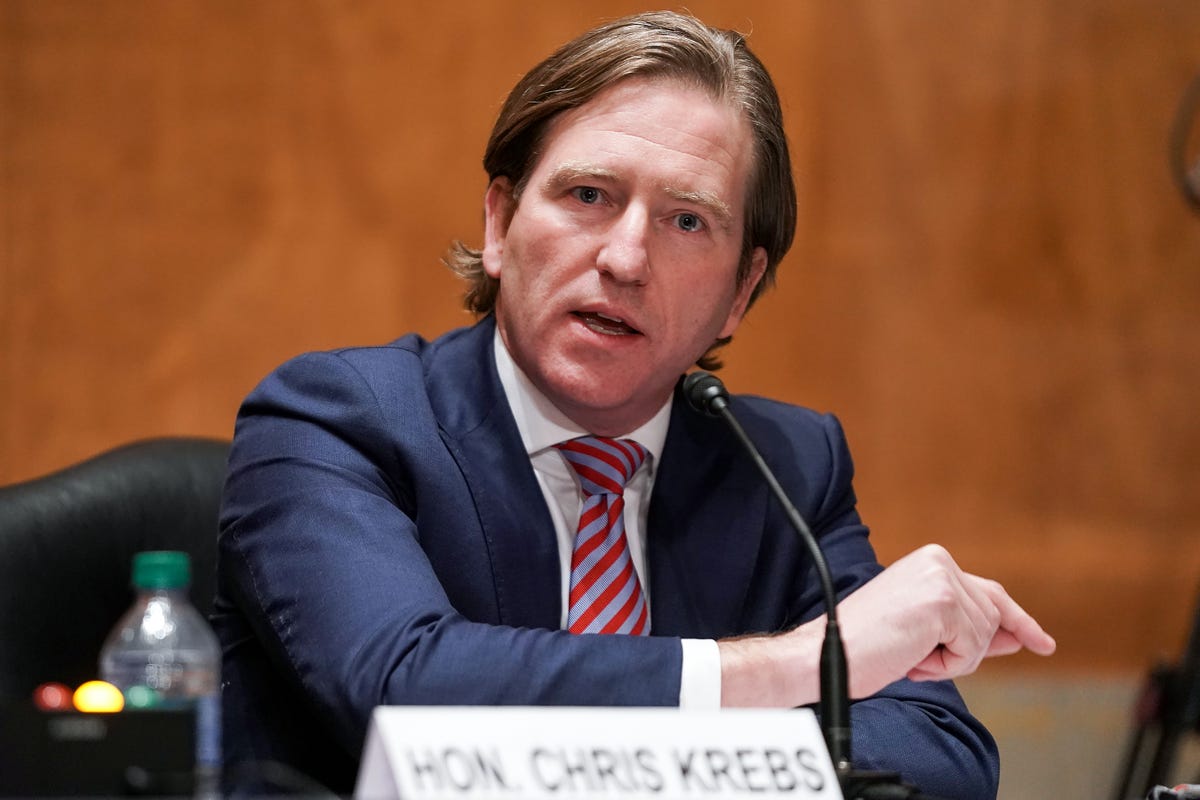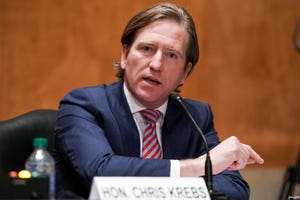What’s happening
The office of Ingham County Clerk Barb Byrum is being inundated with Freedom of Information Act requests.
Why it matters
As for Krebs, he was fired, as he likes to say, by tweet, days later. He’s since gone on to start his own cybersecurity consultancy and co-chaired the Aspen Institute’s Commission on Information Disorder, which studied the effects of misinformation and disinformation. It issued a report late last year that included a set of recommendations for addressing the crisis.
What’s next
“It’s not pretty, and if someone had told me a decade ago that this is where we would be right now, I would not believe them,” she says. “There’s no way.”
Former CISA Director Chris Krebs.
Local elections officials say they’re being flooded with records requests, phone calls and in-person visits from some supporters of former President Donald Trump that still claim that the 2020 election was stolen. They’re swamping their small staffs who need to be focused on preparing for the November elections.


“You can often feel the tension, and that’s concerning,” she says, noting that she’s well enough known and represents a small enough community that she often gets recognized while out in public.
Looking to the not-so-distant future, if those candidates get into office, it could also go so far as to put the 2024 presidential election at risk, says Chris Krebs, former director of the Cybersecurity and Infrastructure Security Agency, the federal agency charged with protecting the nation’s critical infrastructure from cyberthreats.
“It’s not because they aren’t still passionate or don’t love the job,” she says. “It’s directly related to the assault on themselves and the work that they are so passionate about. Boosting the stakes this year is the fact that 2020 election deniers are running for key state-wide offices in more than half the country. Under the guise of election reform, many are campaigning on plans for changes that could disenfranchise countless voters.
Priorities changed, too.
She isn’t alone. Election officials across the country have reported big spikes in FOIA requests. Most, like the ones Byrum has received, are clearly coming from supporters of former President Donald Trump who continue to promote the lie that the 2020 election was stolen.
In particular, security experts worried about the then-use in certain states of direct-recording electronic, or DRE, systems that recorded votes exclusively digitally, without a paper printout that could be audited by election officials or used in a recount.
There also were worries about a potential hacking ahead of the 2020 election, especially related to voter registration databases. Municipal computer systems in multiple states were hit with ransomware attacks, and the FBI confirmed that both Russia and Iran had obtained US voter data with the intent of using it to interfere with the elections by using it to send false information about the election to voters.

That’s what happened in Coffee County, Georgia, where Trump supporters, likely looking for evidence of fraud, managed to illegally copy election software and other data after the 2020 election. Brad Raffensperger, Georgia’s secretary of state, recently said that his office would replace the voting equipment.
Getty
Hacking fears
By the time the 2020 presidential election rolled around, many states had shored up their security. Many electronic-only voting machines were either replaced or retrofitted to include an auditable paper trail. Other outdated and aging voting equipment was dealt with as well.
Many of those candidates have vowed to enact policies that would curtail voting rights for some people under the guise of improving election security. These kinds of laws have already been passed in several states, according to the Brennan Center for Justice, which also notes that they disproportionately affect people of color.
Much was made during the 2016 presidential election about the possibility that a foreign government, such as Russia’s, could “hack” the election, either changing results and winners without anyone knowing or changing them to be so obviously improbable that it would destroy trust in the system. Allen, who was elected for the fifth time this past June, says Shasta County is a tight-knit and giving community that’s far removed from California’s bustling coastal region, adding that she’s always amazed at how much money it can raise for those in need when massive wildfires hit.
They’re also nearing retirement, the fund says. As of last year, 74% of chief local election officials were over age 50, and a quarter were over age 65.
“It’s not new that it could happen,” Patrick says of the breaches. “It’s new because it has happened.”
There also were concerns about the security of online state voter databases. The Department of Homeland Security later confirmed that hackers did try to infiltrate the election systems of 21 states, but the agency says only a few were actually breached and that no vote-tabulation systems were affected.
Candidates that continue to push the “big lie,” that the 2020 presidential election was stolen, are running for key state-wide offices in more than half the country. Democracy advocates fear that if they’re elected they could put in place election laws that disenfranchise many voters, or even chose to not certify the results of the next presidential election if they don’t like the results.
Discussions about potential violence at the polls are also happening in Shasta County, Allen says. For the first time, she says, staffers are “really digging into it.”
In just two short years, Krebs says, the dynamics of election security have changed dramatically. Ahead of the 2020 contests, the federal and state governments had a fairly unified approach, but this year political pressures from election deniers have prompted some states to drop out of federal election security programs that could’ve helped them.
That’s something a lot of people just don’t want to deal with, Byrum said, noting that since the 2020 election, about two dozen of the clerks representing Michigan’s 83 counties have either stepped down or decided not to run for reelection. “This is an assault,” says Byrum, who for the past decade has served as clerk of the county that sits in the middle of Michigan and is home to about 285,000 people, along with the state capitol of Lansing and Michigan State University. In the 2020 election, Biden won the county with about 65% of the vote.
The threat of political violence isn’t an idle one for Byrum and other Michigan elections officials. Two men were convicted in August of plotting to kidnap Michigan Gov. Gretchen Whitmer at her vacation home in 2020 with the intent of starting a national rebellion.
“I’m at the grocery store, you know, and looking for a box of cereal for my kids, and I’m walking by someone who has a ‘Trump Won’ T-shirt on. That certainly doesn’t lend itself to making me feel like my service is appreciated.”
Patrick says it’s the never-ending stream of lies pushing the bogus conspiracy theory that the 2020 election was rigged that’s propelled numerous election-denier candidates through their primaries and into their state’s general elections.
Election deniers are also running in a third of this November’s 30 state attorney general races and 12 of the 27 secretary of state races, according to the group. Three states — Alabama, Arizona and Michigan — have election deniers running for all three of those key offices.
It’s that political movement, along with the disinformation powering it, that has the local election officials far more worried about their neighbors than they ever were about Russia or Iran.
Disinformation breeds election insecurity
Roebuck says his staff is spending about 25% of its time dealing with 2020 election FOIA requests along with countless phone calls from people asking about everything from the brand of voting equipment used by the county to how it stores that gear.
Throughout the following days, Trump continued to tweet lies that the election was rigged through voting systems, stoking the flames of misinformation and disinformation that months later would be followed by the deadly Jan. 6, 2021, storming of the US Capitol by some of his followers. “If we have a problem in November of ’22 that only helps bolster their narrative, which helps them make more money from folks who have been taken in by their bad messages and their false information,” she says.

The often three- or four-page requests being sent from all over the country need to be individually reviewed by her staff and legal counsel to make sure that they’re responded to properly, sucking up time and resources.
Allen noted that a Shasta County appearance in September by Douglas Frank, the high school math and science teacher from Ohio whose sham analysis of the 2020 election has been glorified by election conspiracy theorists, drew a paid crowd of more than 100 people.
The fact that some people continue to deny that two years later still gets him riled up.
While disinformation is clearly having an effect on elections and the people who run them, it’s also affecting the people who are running in them.
But Byrum says the insider threat goes beyond well-meaning election workers who’ve been indoctrinated with misinformation. Clerks have to worry about inadvertently hiring moles bent on intentionally disrupting the process.
“I’ve gotten a lot of shit for saying [that],” he said. “But let’s be perfectly freaking clear here. It was the most scrutinized election. It was the most litigated election. It was the most audited election. There were the most paper ballots associated with votes in this election. It was a legit free and fair election.” Elections officials say the spike in FOIA requests is just the most recent attack against the elections system at the state and local level from those who seek to undermine trust in the system for their own political gain. When people lose that trust, they don’t vote, or they vote for candidates they might not otherwise consider, they say. That could be especially disastrous in a non-presidential year like this one with generally lower voter turnout. Meanwhile, while workloads have ballooned, many municipal budgets haven’t. One of the biggest challenges facing elections is that they’re “perpetually underfunded,” Patrick says. When funding does come, it’s usually a lump sum tied to some kind of event like a presidential election, which makes it tough for local officials to determine how much they can spend on things like staff and security each year.
Most of the requests feature the same text, but the county is required by law to respond to each of them in a timely manner. So instead of focusing on the upcoming November elections, Byrum says, her staff is spending a large part of its time and resources to deal with one that was supposed to be settled two years ago.
As many municipal employees who work full time for election departments struggle with increasing workloads that often aren’t offset by budget and staffing increases, their population is dwindling.
Deniers of the 2020 election results are running for key offices this November in 27 states, according to the nonpartisan group States United. That includes half of this year’s 36 governor’s races, with 15 of those candidates running as Republicans.
“Sitting down, taking the training and serving on Election Day is a great way to expose someone to the process to see how it works, calm their concerns and fears and also give them a perspective that they didn’t have before,” he says.
Meanwhile, Roebuck’s election workers are reading news accounts of some of the things happening nationally and asking about what’s being done to protect their physical safety. In response, Roebuck, the father of two young children, says he’s holding tabletop exercises with local clerks and the county’s sheriff department, so election workers know what to do if there’s ever a threat to their safety.
Both Smith, of Verified Voting, and Krebs say this also means educating kids about the election process, and they note that many schools don’t teach basic civics anymore.
But the recent “mass exodus” of workers from the profession goes beyond retirements and aging, says Tammy Patrick, the Democracy Fund’s senior adviser for elections.
She pointed to reports of election workers being encouraged by Republican Party officials to ignore rules and sneak cellphones or small notepads and pens into vote counting centers so they can take notes and report back to party officials. Some states ban the use of smartphones and writing utensils in polling places in an attempt to preserve voter privacy.
That’s despite the fact that Trump won Ottawa County in 2020 with about 60% of the vote.
He says it’ll be up to voters to ask the right questions and not blindly trust what candidates or anyone else says. At the same time, candidates have an obligation to be truthful.
“I think what we’re seeing, not just here but nationally, is a playing on the fears that people have and using it to political advantage,” Robuck says. “And I think that’s dangerous.”
“It’s a victim of the ‘stop the steal’ movement, ‘the big lie,’ that fact one person just couldn’t take the ‘L’ and go on with their life,” Krebs says. “Instead, they had to have this political movement and the way that’s manifested isn’t so much at the national level. It’s metastasized at the state and local level.”
That hasn’t stopped some of his supporters and they’re only getting angrier.
On top of that, it’s also possible that state officials working in tandem could refuse to certify an election’s results if they don’t like the result. Krebs notes that if the key swing states of Michigan, Arizona and Pennsylvania — three states with election deniers on the ballot this November — had gone the other way in 2020, Trump would still be president, which actually would have amounted to a stolen election.
Shrinking workforces and flat budgets
As of today, only six states still use DRE systems, and all those states have some sort of plan to replace them in the near future, says Pamela Smith, president and CEO of Verified Voting, which for a long time has tracked the use of election technology.
Partially in response to that, elections were declared critical infrastructure in 2017, the same as power plants and oil pipelines, making federal funding available and allowing CISA to get involved.
Officials for the Michigan Republican Party didn’t respond to an email seeking comment.
The filings asking for the county records aren’t coming from the local media or even political candidates looking to dig up the voting records of their rivals. They’re being sent by seemingly regular people. What they all have in common is they’re looking for information about how the county conducted the 2020 presidential election.
“This is a defining moment in American democracy,” Krebs said in an interview. “Do we want to be a democracy? If so, we need to get out and vote like it and not put deniers into positions of authority.”
Patrick says the irony is that it’s truly up to those who vote in November to decide which way they want things to go.
As for today’s adult voters, Krebs was a bit more blunt.
She says she’s not upset with the individual people sending the requests, but she does object to the groups pushing people to send them, saying they want to disrupt preparations for November for their own political and financial gain.
The impact of misinformation and disinformation is also being felt across the country in Northern California’s majority Republican Shasta County, where Cathy Darling Allen serves as clerk and registrar of voters. Though her office received just three Public Records Act (California’s version of a FOIA) requests in all of 2021, more than 50 landed on her desk in just July and August of this year.
“These precinct workers are supposed to be employees of the local clerk,” she says. “They take an oath of office and it makes it much more difficult when the party is actively recruiting spies.”
Fears for future elections
In general, the smaller the community, the fewer full-time election workers on the payroll in the first place, and more than a third of communities don’t even have one full-time election employee, according to the Democracy Fund, an independent, nonpartisan foundation that, among other things, promotes free and fair elections.
But none of those attempts actually interfered with the elections themselves, and there’s no evidence of any kind of widespread election fraud. Krebs, who as CISA director had spearheaded a campaign to combat election-related disinformation, declared the 2020 vote the “most secure election” in American history.
“It’s a personal affront to election officials when people challenge and impune the integrity of the election system.”
For Roebuck, the Ottawa County, Michigan, clerk who’s worked to build trust in his county’s elections, the possibility of having election deniers decide how elections will be run at the state level could prove to be a “huge challenge.”
“My great hope — and hope’s a terrible strategy — is Americans see through the BS and turn out and don’t elect election deniers,” he says.
What’s worse, Byrum says, is when resources are spread thin and staff is overworked, there’s a real possibility that election security could be affected. For example, a clerk who is short on time might decide to email a password instead of following the procedure of giving it over the phone.
Meanwhile, more election deniers in Congress could potentially negate future election results at the national level too. On the same day that Trump supporters stormed the US Capitol, a total of 147 Republicans in the House and Senate combined voted to overturn the presidential election results, despite no evidence of fraud.
There are also internal security threats that need to be guarded against, Roebuck says. Ottawa County trains about 1,200 election workers each cycle. Part of the challenge this year, he said, has been correcting the misinformation they may have gotten from their respective political parties.
Roebuck says he didn’t mind the many questions brought up by skeptical new election workers ahead of the state’s primaries this summer.
The county clerks, along with advocates for free and fair elections, say those people are being manipulated by Trump and others and aren’t actually looking for answers. They’re just trying to monopolize their time and resources ahead of the midterms.
Like Ingham County’s Byrum, Patrick says mistakes will be made during elections if workers are exhausted. Also like Byrum, she worries about the possible effects of disinformation on election workers who might buy into a conspiracy theory and then give people access to computer systems or voter equipment that they shouldn’t.
Back in Michigan, the impact of misinformation and disinformation is also felt by Justin Roebuck, who for the past six years has served as clerk of the heavily Republican Ottawa County on the shores of Lake Michigan, about 85 miles to the west of Byrum’s home in Ingham County.
That’s especially true in Michigan, a swing state with 16 electoral votes. President Joe Biden narrowly won it in 2020 after Trump took the state four years before with an equally slim margin. The Trump campaign filed court challenges to Michigan’s results, claiming voter fraud and that its election systems were insecure, but they were all ultimately dismissed.
Byrum, the clerk in Ingham County who previously served three terms as a Democratic member of the state’s legislature, says people are “more charged” these days when talking about elections and election administrators.
“I think there’s a mindset of security now that wasn’t always there before,” Smith says, adding that though in years past, security might’ve been one of the things considered by elections officials, it took the targeting of voter databases to bring it to the forefront for everybody.
Patrick and the county clerks also said that everyone who can, even those with questions or who are skeptical about the election process, should get involved and sign up to work a polling place on Election Day. The important thing is that they’re coming from a place of wanting to learn about and understand the election process.





